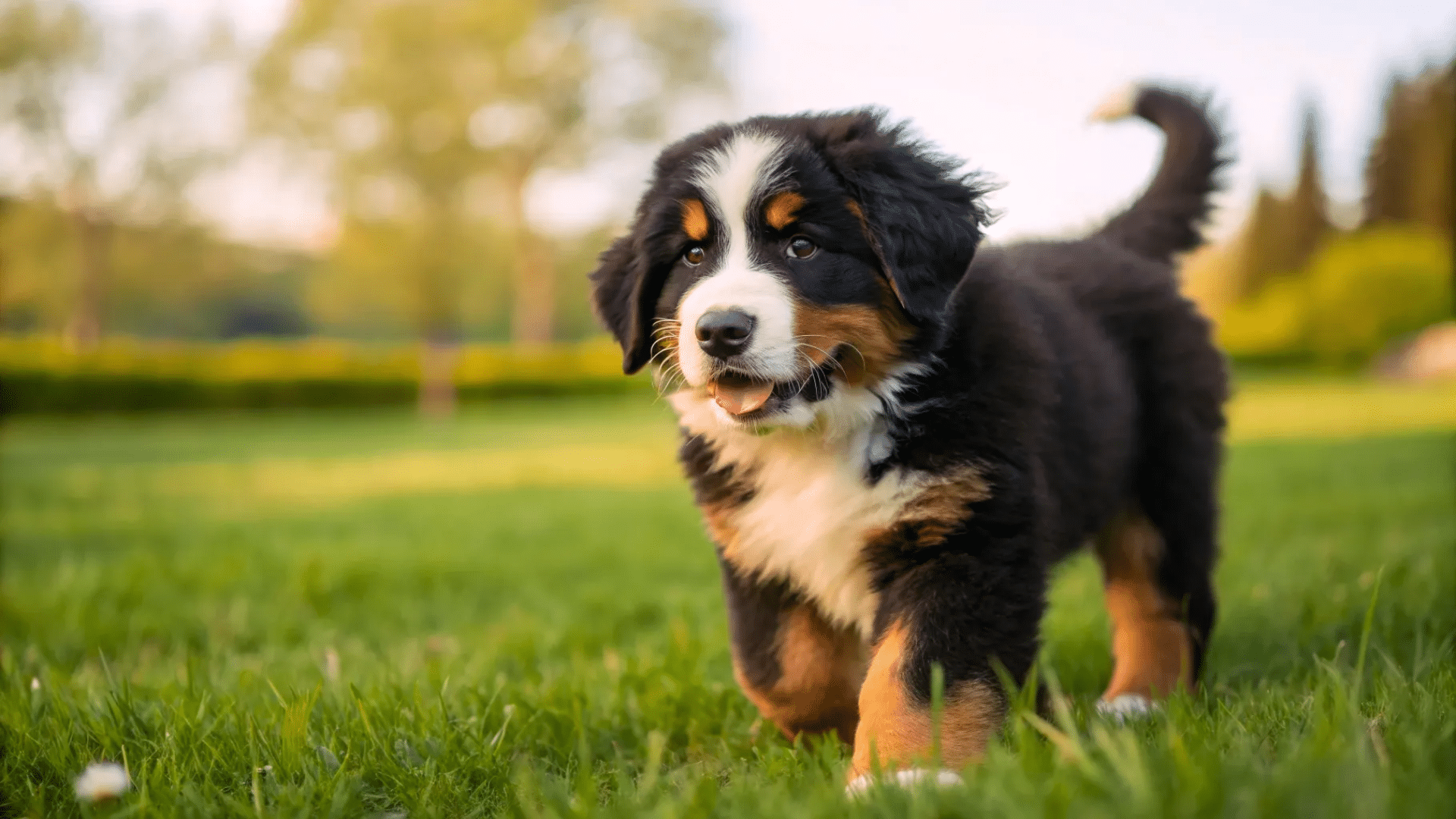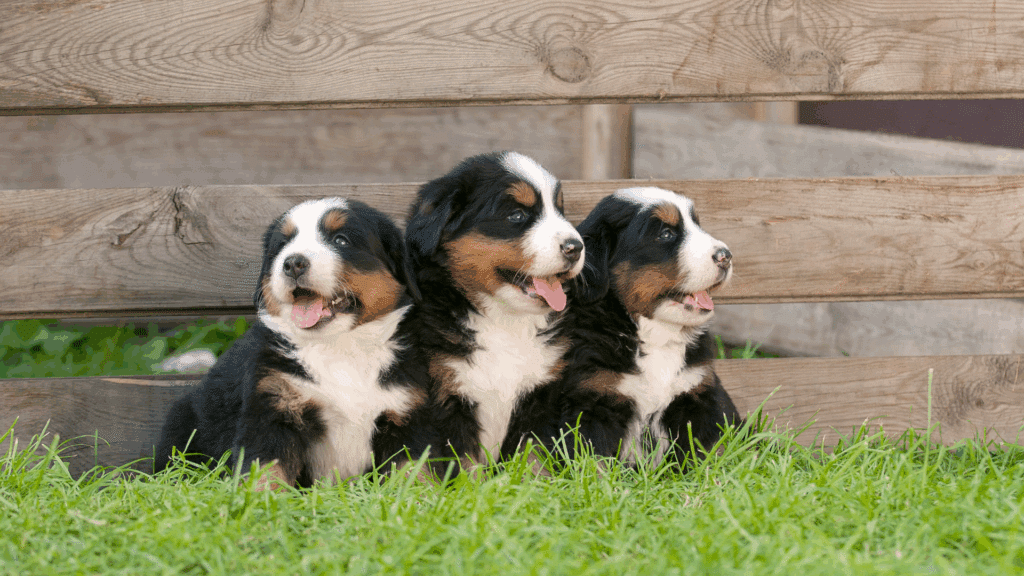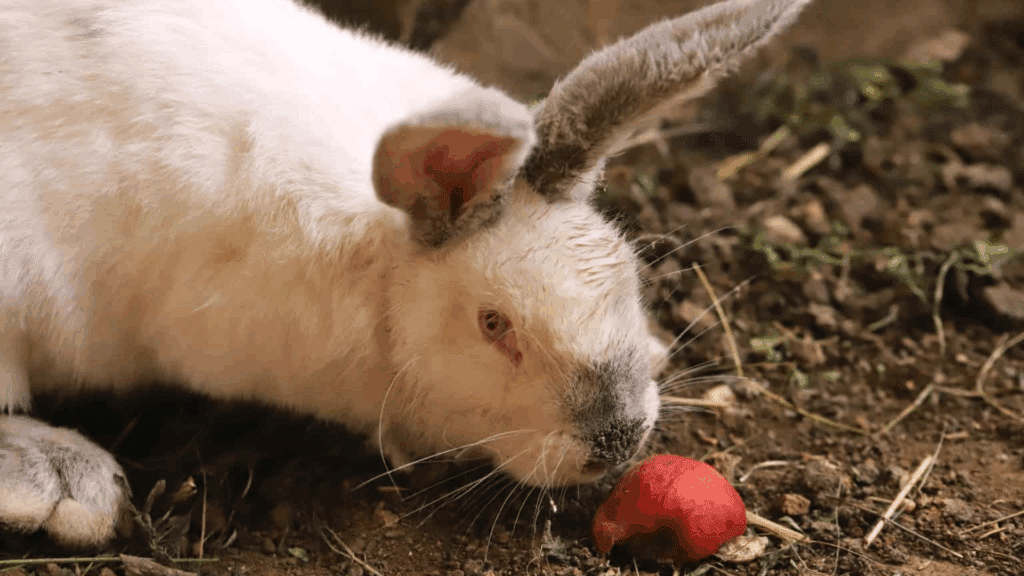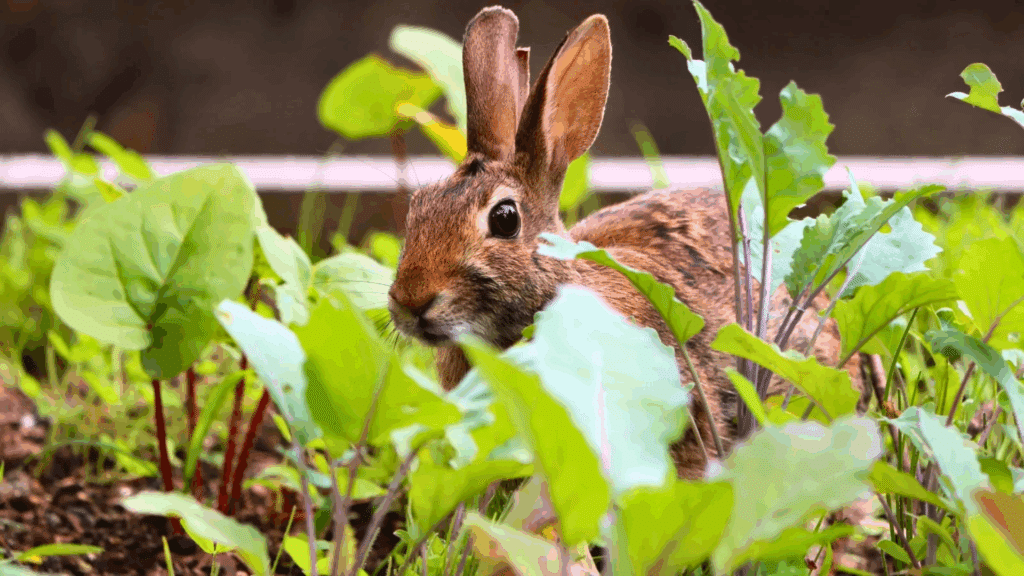If you’re planning to welcome a Bernese Mountain Dog puppy, get ready for plenty of love and joy.
These dogs are gentle, loyal, and friendly, which makes them perfect for families with children or adults who enjoy a loyal companion.
They love spending time outdoors, joining walks, or relaxing beside you at home. Before you bring one home, it’s important to learn about its care, health, and personality.
Choosing a trusted breeder or rescue ensures your puppy starts life healthy and happy.
With patience, training, and daily care, your Bernese Mountain Dog puppy will grow into a loving, faithful friend who brings happiness and warmth to your family for many years.
About Bernese Mountain Dog Puppies
Bernese Mountain Dog puppies are gentle, loyal, and easy to love. They have a thick, tri-colored coat and grow into strong, calm dogs. If you want a family-friendly pet, this breed is a great choice.
These pups usually weigh 10–20 pounds at eight weeks and can reach over 100 pounds as adults.
They love company and may feel sad if left alone too long. Their long fur needs regular brushing, and vet visits are important since they can face joint or heart problems later in life.
With good care, they live about 7–10 years and bring steady joy to your home.
I’ve noticed they’re patient, gentle with kids, and eager to please. If you have time and space, a Bernese Mountain Dog puppy can become your loyal, lifelong friend.
Growth and Development Stages
Watching a Bernese Mountain Dog puppy grow is one of the best parts of owning one. I’ve seen how quickly they change in size, energy, and behavior during the first year. Here’s what you can expect as your puppy grows.
1. Neonatal / Early Puppy Stage (0–8 weeks)
At this stage, puppies rely completely on their mother for food, warmth, and comfort. Their eyes open around two weeks, and they start walking shakily by week three.
Breeders handle early socialization by introducing gentle touch and simple sounds.
I never recommend bringing a puppy home before eight weeks because this time with their littermates teaches bite control, social cues, and confidence.
When you finally bring your puppy home, they should already be used to basic handling and light noises.
2. Socialization & Fear Periods (8–16 weeks)
This is when your puppy’s personality starts to shine. They’re eager to explore but can also get startled easily.
I suggest introducing new experiences one at a time, different people, safe dogs, car rides, and short outings, while keeping things positive. Avoid forcing them into scary situations.
Pair every new experience with treats and praise. This is also the time to begin crate training and simple commands like “sit” or “come.”
A calm, confident approach during this stage builds a well-balanced adult dog.
3. Juvenile to Adolescence (4–9 months)
Your puppy is growing fast and testing limits now. You may notice stubborn behavior or selective listening; it’s normal. This stage feels like the teenage phase for dogs.
Keep training sessions short, clear, and consistent. Daily exercise and mental challenges help manage their growing energy.
Chewing can return as adult teeth set in, so keep plenty of sturdy toys around.
I’ve found that keeping a steady routine and rewarding calm behavior goes a long way in guiding them through this phase.
4. Maturation & Final Growth (9–18+ months)
Your Bernese is nearly full-sized by now, though mental maturity takes a bit longer. This is when muscle tone develops, and its gentle, steady nature becomes clear.
Continue reinforcing obedience and recall skills; large breeds like Bernese need reliable listening habits.
Be patient; they can still act puppy-like for quite some time. Balanced nutrition, regular vet checkups, and steady exercise are key during this period.
Around this time, your dog begins settling into the calm, loyal personality the breed is known for.
Best Ways to Get a Bernese Mountain Dog Puppy Safely

If you are looking for a Bernese Mountain Dog puppy, there are a few ways to find one. You can adopt from a rescue or buy from a breeder.
Each option has its own benefits and things to consider:
| Option | Pros | Cons |
|---|---|---|
| Adoption | Puppies or adults may already be vaccinated and socialized, which helps a dog in need | Limited availability; may not get a puppy of a specific age or look |
| Buying from Breeders | Can choose specific age, traits, or lineage; breeders provide health records | Usually more expensive; requires careful research to find a reputable breeder |
| Online Listings | Easy to browse multiple options in your area | Risk of scams; need to verify credibility |
Both adoption and buying from breeders can give you a loving Bernese companion if you choose carefully. Always research and visit in person when possible to ensure a healthy and happy puppy.
How to Find Trusted Bernese Mountain Dog Breeders?
Finding the right Bernese Mountain Dog breeder takes time and patience. I’ve learned that doing your homework first can help you avoid problems and bring home a healthy, well-cared-for puppy you can trust.
- Start with Research: Look for breeders registered with kennel clubs or breed organizations. Read reviews, check websites, and look for clear health information.
- Ask About Health Testing: Reputable breeders test for hip, elbow, and heart conditions, common issues in Bernese Mountain Dogs.
- Visit in Person: A clean, safe environment shows the puppies are cared for properly. Watch how the puppies interact with people.
- Request Medical Records: Ask for proof of vaccinations, deworming, and health screenings.
- Observe the Parents: Meeting the puppy’s parents helps you understand temperament, size, and health history.
- Ask Questions: Inquire about feeding routines, socialization, and early training. A good breeder will be happy to share details.
- Watch for Red Flags: Avoid breeders who refuse visits, rush sales, or can’t provide papers. Multiple breeds for sale are also a warning sign.
- Get References: Contact past buyers to confirm the breeder’s reliability and puppy care standards.
A trusted breeder cares more about finding the right home than making a quick sale. Taking these steps ensures you bring home a healthy, happy Bernese Mountain Dog puppy.
Trusted Websites to Find Bernese Mountain Dog Puppies
If you want to find a healthy Bernese Mountain Dog puppy, I suggest you start with trusted websites that list responsible breeders and rescues. The American Kennel Club (AKC) Marketplace is a reliable place.
Find breeders with health records and good practices offering puppies near you.
Another great option is the Bernese Mountain Dog Club of America (BMDCA). They offer a breeder directory and help rescue Bernese dogs.
You can also check breed-specific rescue groups like the National Bernese Mountain Dog Rescue Network. These groups focus on saving and rehoming dogs in need.
Remember, always check health records and visit the breeder or rescue if possible.
Avoid offers that seem too good to be true. Using these trusted sites will help you find a happy, healthy Bernese puppy ready to join your family.
How to Verify Puppy Listings and Avoid Scams?
Finding a Bernese Mountain Dog puppy online can be exciting, but it’s essential to verify the listing’s legitimacy. Scammers often target buyers seeking specific breeds, making careful verification essential.
- Check breeder credentials: Look for AKC registration, membership in breed clubs, and transparent breeding practices.
- Confirm health tests and vaccination records: Ensure the puppy has proper health clearances for hips, elbows, and heart, along with up-to-date vaccinations.
- Avoid deals that seem “too good to be true”: Extremely low prices are often a red flag.
- Ask for references from previous buyers: Talking to past customers helps gauge the breeder’s reliability and care standards.
Following these steps ensures a safe, responsible, and rewarding experience when adopting a puppy.
Bernese Mountain Dog Puppy Prices
Owning a Bernese Mountain Dog is a long-term financial commitment that goes beyond the initial puppy price. Factoring in lifetime expenses helps you plan realistically for your dog’s care and comfort over the years.
1. Initial Costs (puppy, supplies, first vet visits)
Bernese Mountain Dog puppies usually cost between $700 and $2,000 from reputable breeders, depending on lineage, health checks, and breeder reputation.
Puppies from champion lines may cost more. Adopting from a rescue averages $50–$500, often covering vaccinations and spaying/neutering.
Add about $300–$700 for supplies like food bowls, a crate, bedding, toys, and the first vet visit for checkups and preventive care.
2. Recurring Costs (food, grooming, vet, insurance)
Expect monthly expenses between $227 and $540 for food, grooming, and health needs. Bernese dogs eat large portions and need regular grooming due to their thick coats.
Annual vet exams, flea and tick preventatives, and vaccinations add to the total.
Pet insurance can help cover emergencies or long-term health issues, especially since Bernese Mountain Dogs are prone to joint and heart conditions.
Over a 7–9 year lifespan, lifetime costs can easily reach $20,000–$40,000.
Nutrient Requirements for Large Breed Puppies
Feeding a Bernese Mountain Dog puppy isn’t just about giving enough food; it’s about giving the right kind. I’ve learned that large-breed puppies grow quickly, so their diet must support steady growth instead of fast weight gain.
The right balance of nutrients helps protect their bones, joints, and overall development as they mature into strong, healthy adults.
- Protein: Builds muscle and supports healthy growth; aim for a moderate level (22–26%) from meat or fish.
- Calcium & Phosphorus: Supports bone and joint development; maintain a balanced ratio (1.2:1 to 1.4:1).
- Fat: Provides energy and keeps the coat healthy; includes Omega-3 and Omega-6 fatty acids.
- Fiber: Aids digestion and keeps stools firm; choose sources from whole grains and vegetables.
Sample Feeding Schedule and Portion Sizes by Age
Every puppy grows differently, but following a schedule helps you stay consistent. I like to split meals into smaller portions so the puppy doesn’t overeat or feel too full.
| Age | Meals per Day | Portion Guidance | Notes |
|---|---|---|---|
| 8–12 weeks | 3–4 small meals | Divide the total daily food into smaller servings | Helps digestion and keeps energy steady |
| 3–6 months | 3 meals | Adjust based on weight and activity level | Keep feeding times consistent each day |
| 6–12 months | 2 meals | Follow the large-breed feeding chart on the food label | Avoid overfeeding; check if the ribs can be felt slightly |
| 12–18+ months | 2 meals | Gradually move toward adult portions | Consult your vet before switching to adult food |
Keep an eye on your puppy’s body shape; you should feel their ribs but not see them.
If they’re gaining too quickly or looking round, reduce portions slightly. If they seem thin or low on energy, add a bit more food after talking to your vet.
Dealing with Food Sensitivities
Some Bernese puppies can have sensitive stomachs or mild food allergies. I’ve seen this show up as itching, ear infections, or loose stools. If you notice these signs, check with your vet before making changes.
They might suggest a limited-ingredient or hypoallergenic formula that’s easier to digest.
When switching food, do it slowly, mix small amounts of the new food with the old one over 7–10 days. Keep a simple feeding journal to note reactions or improvements.
Paying attention early helps you find what works best and keeps your puppy feeling comfortable and healthy.
Training and Behavioral Tips for Bernese Puppies

Starting training early helps Bernese Mountain Dog puppies grow into well-behaved, happy adults. These are some key tips that will guide you:
1. Socialization Milestones
Expose your Bernese puppy to new people, animals, and environments as early as 8 weeks.
Start with calm, positive experiences like short visits to parks or walks near quiet streets. Let them meet friendly dogs and humans at their own pace.
Reward calm behavior with treats and gentle praise. Gradually increase exposure so they learn to feel safe in various surroundings without fear or overstimulation.
2. Basic Obedience Commands & Training Progression
Begin with simple commands like “sit,” “stay,” and “come.” Use short training sessions, five to ten minutes, to hold their attention. Keep rewards consistent and tone gentle.
As your Bernese puppy matures, add leash manners and recall practice. Consistency is key; reinforce learned commands before moving to harder ones.
This step-by-step approach builds confidence and reliable obedience over time.
3. Crate Training, Housebreaking, & Routine Building
Choose a crate large enough for comfort but not too roomy. Introduce it as a cozy retreat, not punishment.
Create a schedule for meals, play, and bathroom breaks to help your puppy learn bladder control. Take them out after eating, sleeping, or playing.
Praise success right away. Over time, your Bernese will associate routine with comfort, making house training smooth and stress-free.
4. Handling Separation Anxiety & Separation Stress
Bernese puppies form strong attachments, so being alone can feel stressful at first. Begin by leaving them for short periods and slowly extend the time as they adjust.
Place a familiar toy or blanket in their crate to provide comfort. Keep departures and arrivals calm to avoid building anxiety. Gradual independence training teaches them that being alone is safe.
With patience and consistency, your puppy will learn to relax and trust that you’ll always return.
5. Managing Chewing, Mouthing, & Teething Phase
Bernese puppies love to chew, especially during the teething stage. Offer sturdy chew toys to ease their discomfort and protect your furniture.
If your puppy mouths your hands or nips at objects, calmly redirect them to an appropriate toy.
Praise them when they chew the right thing to reinforce good behavior. Keep a rotation of toys to maintain interest and always supervise playtime.
This consistent guidance helps your puppy learn boundaries while keeping them safe and content.
6. Developing Focus, Impulse Control, & Recall
Teach your Bernese puppy to focus despite distractions using short attention games. Practice “wait” and “leave it” commands to build patience and self-control.
For recall, use a cheerful tone and high-value treats to make returning to you rewarding.
Train in safe, enclosed areas before moving outdoors. Consistent, fun practice helps your large breed learn to listen even in exciting settings.
What to Buy Before Bringing Your Puppy Home?
Before your Bernese Mountain Dog puppy arrives, it helps to have everything ready. I’ve found that a few simple essentials can make the first days easier for both you and your new pup.
- Food and Water Bowls: Choose sturdy, non-slip bowls for daily use.
- High-Quality Puppy Food: Ask your breeder or vet for a trusted brand.
- Comfortable Bed: Get a soft, washable bed for cozy naps.
- Crate or Playpen: Helps with training and keeps your puppy safe when unsupervised.
- Collar and Leash: Make sure they fit well and are gentle on your puppy’s neck.
- Puppy Toys: Chew toys and soft toys keep them busy and happy.
- Brush and Grooming Supplies: Bernese puppies need regular brushing to manage their thick coats.
- ID Tag and Microchip Info: Important for safety and quick identification.
- Vet Contact Info: Have your veterinarian’s number ready before bringing your puppy home.
Preparing for the Future: Adult and Senior Transition
Bernese Mountain Dogs grow into calm, loyal companions, but their needs change as they age. I’ve learned that preparing early for these transitions keeps them healthy, happy, and comfortable through every life stage.
1. Transitioning to Adulthood
As your Bernese reaches adulthood, around 18 to 24 months, it’s time to adjust their care routine. Switch gradually from puppy food to large-breed adult food over 7–10 days to prevent stomach upset.
Adult dogs need fewer calories but still benefit from nutrient-rich meals.
Exercise remains important, but focus on controlled activities like walking or swimming instead of long runs. Continue training to reinforce good manners and keep their minds sharp.
2. Health Monitoring in Adult & Senior Life
Once your dog reaches age four or five, regular vet checkups every six months become more important.
Keep track of weight, appetite, and energy levels; changes can point to early joint or heart issues. I also suggest blood tests during annual visits to catch potential problems early.
Staying alert to subtle shifts in behavior or stamina helps ensure your Bernese stays healthy longer.
3. Supporting Mobility & Joint Health in Senior Dogs
As your Bernese slows down, joint care becomes key. Add vet-approved joint supplements like glucosamine or fish oil to support mobility. Shorter, gentle walks and soft bedding help reduce strain on hips and elbows.
You might need to adjust feeding portions as their metabolism slows.
Keeping their living space safe, non-slip rugs, and easy-to-reach resting spots make a big difference in comfort and confidence.
4. End-of-Life Care & Maintaining Quality of Life
When your Bernese reaches their senior years, around 7–9 years old, focus on comfort and quality of life.
I’ve found that regular vet visits, a soft resting space, and gentle companionship make these years meaningful.
Watch for signs of pain, confusion, or loss of appetite, and discuss care options with your vet. Compassion and presence matter most at this stage.
Being there for your dog in their final years is a true act of love and gratitude for all they’ve given you.
Conclusion
Bringing home a Bernese Mountain Dog puppy is both exciting and rewarding.
These gentle, loyal dogs are perfect family companions, but choosing the right puppy matters. Find a reputable breeder who values health, care, and socialization.
Always ask questions, check health papers, and see the environment where the puppies are raised.
Bernese puppies grow fast. They need nutritious food, regular exercise, and early training to stay healthy and happy. Owning one means long-term commitment and daily care.
In return, you’ll gain a devoted, loving friend who fills your home with warmth and joy.
With the right preparation and patience, your Bernese Mountain Dog will become a cherished part of your family for years to come.








